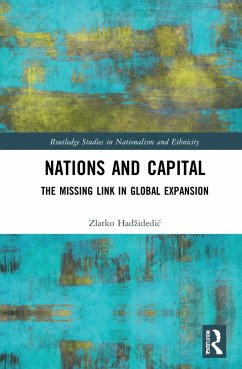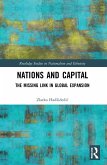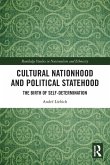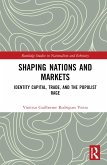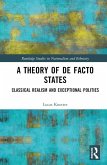Capitalism survives by adapting. Marx exposed its reliance on exploiting labour to generate profit. Polanyi warned that its hunger to commodify everything-nature, work, and even human bonds-destroys societies, sparking chaos. Yet capitalism endures, mutating through crises. Why?
Nations and Capital reveals the missing mechanism: nationalism.
Where Marx saw revolution, and Polanyi foresaw self-destruction as capitalism's endgames, this book uncovers nationalism as the system's ultimate safeguard. When markets erode trust or class conflict threatens profits, nationalism steps in-manufacturing loyalty, dividing the oppressed, and recasting exploitation as collective destiny. Capitalism doesn't merely use nationalism; it depends on it to fragment resistance, privatize solidarity, and keep us fighting each other instead of the system devouring us all.
When neoliberalism irreversibly ripped society's fabric, capitalism didn't abandon nationalism: hyper-capitalism, today's system of limitless extraction, abandons democracy instead and turns to authoritarian nationalism. This shift isn't a rupture but a revelation: nationalism was never a phase; it is capitalism's life support, mutating to sustain accumulation, from colonial empires to digital oligopolies.
Why does this matter? Because tomorrow's crises-global economic collapse, the breakup of international order, pandemics-will be met with nationalism's toxic embrace unless we confront its role as capitalism's oxygen. Written from Bosnia and Herzegovina-a periphery where global capital and nationalist oligarchies joined forces to entrench ethnic partition-this theory of nationalism sees what thinkers in capitalism's core could not: nationalism is not a byproduct of industrial capitalism's need for labour's cultural homogeneity (Gellner) or print capitalism's construction of "imagined communities" (Anderson). It is the lifeblood of a system that cannot survive without converting solidarity into division, belonging into exclusion, and hope into fear.
Marx and Polanyi gave us the diagnosis. Nations and Capital completes it: understanding capitalism's survival requires understanding nationalism as the other side of capitalism's coin.
Nations and Capital reveals the missing mechanism: nationalism.
Where Marx saw revolution, and Polanyi foresaw self-destruction as capitalism's endgames, this book uncovers nationalism as the system's ultimate safeguard. When markets erode trust or class conflict threatens profits, nationalism steps in-manufacturing loyalty, dividing the oppressed, and recasting exploitation as collective destiny. Capitalism doesn't merely use nationalism; it depends on it to fragment resistance, privatize solidarity, and keep us fighting each other instead of the system devouring us all.
When neoliberalism irreversibly ripped society's fabric, capitalism didn't abandon nationalism: hyper-capitalism, today's system of limitless extraction, abandons democracy instead and turns to authoritarian nationalism. This shift isn't a rupture but a revelation: nationalism was never a phase; it is capitalism's life support, mutating to sustain accumulation, from colonial empires to digital oligopolies.
Why does this matter? Because tomorrow's crises-global economic collapse, the breakup of international order, pandemics-will be met with nationalism's toxic embrace unless we confront its role as capitalism's oxygen. Written from Bosnia and Herzegovina-a periphery where global capital and nationalist oligarchies joined forces to entrench ethnic partition-this theory of nationalism sees what thinkers in capitalism's core could not: nationalism is not a byproduct of industrial capitalism's need for labour's cultural homogeneity (Gellner) or print capitalism's construction of "imagined communities" (Anderson). It is the lifeblood of a system that cannot survive without converting solidarity into division, belonging into exclusion, and hope into fear.
Marx and Polanyi gave us the diagnosis. Nations and Capital completes it: understanding capitalism's survival requires understanding nationalism as the other side of capitalism's coin.
"Hadzidedic travels much further with the ambitious goal of opening up a new line of research. The result is a highly knowledgeable book which sheds light on the one of the founding relationships of the modern age. It is perhaps among the most innovative books on the theory of nationalism that has been published over the last 20 or 30 years."
Daniele Conversi, writing in Ethnic and Racial Studies 2022
"Nationalism is not only a political phenomenon. It is a set of social practices that also shape and are shaped by economic forces. Hence in this very perceptive and enlightening book "Nations and Capital: The Missing Link in Global Expansion," Zlatko Hadzidedic explores the relationship between nationalism and capitalism. Most scholars agree that there are strong links between these two historical processes but very few have explored their relationship in a greater detail. Hadzidedic's book aims to fill this explanatory gap by identifying different historical and social mechanisms that have made the emergence and expansion of nationalism in the context of capitalism possible."
Sinisa Malesevic, writing in Nationalities Papers 2023
"In Nations and Capital. The Missing Link in Global Expansion, Zlatko Hadzidedic attempts to provide a definitive account of the rise of nationalism as a necessary mechanism to ensure capitalism's global expansion from the early 'core' (mainly the Netherlands and England or Britain, later joined by the United States) to the rest of the world. The argument is clear and coherent: capitalism in the form of relentless pursuit of wealth accumulation needed nationalism to survive, grow and expand and that is the origin of nationalism. The crucial importance of nationalism for capitalism in its perpetual growth and expansion is captured succinctly in the title of the second part, entitled 'No capitalism without nationalism'. From the perspective of theories of nationalism, Hadzidedic belongs to the same camp as Ernest Gellner, since nationalism is essentially seen as an epiphenomenon of capitalism's global expansion. What moves the world, and therefore history, at the end of the day is capitalism, and nationalism facilitates its operation."
Atsuko Ichijo, writing in National Identities 2023
Daniele Conversi, writing in Ethnic and Racial Studies 2022
"Nationalism is not only a political phenomenon. It is a set of social practices that also shape and are shaped by economic forces. Hence in this very perceptive and enlightening book "Nations and Capital: The Missing Link in Global Expansion," Zlatko Hadzidedic explores the relationship between nationalism and capitalism. Most scholars agree that there are strong links between these two historical processes but very few have explored their relationship in a greater detail. Hadzidedic's book aims to fill this explanatory gap by identifying different historical and social mechanisms that have made the emergence and expansion of nationalism in the context of capitalism possible."
Sinisa Malesevic, writing in Nationalities Papers 2023
"In Nations and Capital. The Missing Link in Global Expansion, Zlatko Hadzidedic attempts to provide a definitive account of the rise of nationalism as a necessary mechanism to ensure capitalism's global expansion from the early 'core' (mainly the Netherlands and England or Britain, later joined by the United States) to the rest of the world. The argument is clear and coherent: capitalism in the form of relentless pursuit of wealth accumulation needed nationalism to survive, grow and expand and that is the origin of nationalism. The crucial importance of nationalism for capitalism in its perpetual growth and expansion is captured succinctly in the title of the second part, entitled 'No capitalism without nationalism'. From the perspective of theories of nationalism, Hadzidedic belongs to the same camp as Ernest Gellner, since nationalism is essentially seen as an epiphenomenon of capitalism's global expansion. What moves the world, and therefore history, at the end of the day is capitalism, and nationalism facilitates its operation."
Atsuko Ichijo, writing in National Identities 2023

